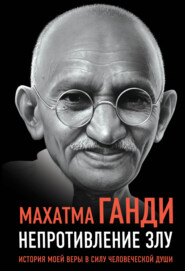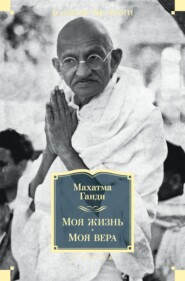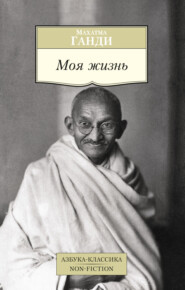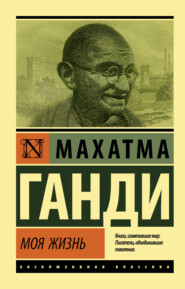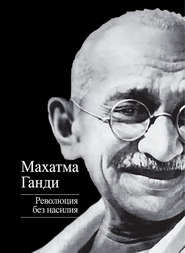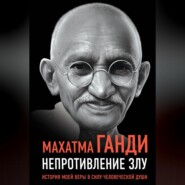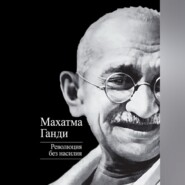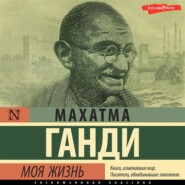По всем вопросам обращайтесь на: info@litportal.ru
(©) 2003-2024.
✖
The Story of My Life / История моей жизни
Настройки чтения
Размер шрифта
Высота строк
Поля
The Story of My Life / История моей жизни
Махатма Карамчанд Ганди
Great books
Махатма Ганди – индийский политический и общественный деятель, боровшийся за независимость Индии от Великобритании. Он известен своей философией ненасилия под названием сатьяграха, оказавшей большое влияние на движения сторонников мирных перемен.
Автобиография Ганди «Моя жизнь» рассказывает о его становлении и духовных исканиях, а также о борьбе за права в Южной Африке и об освобождении Индии. Кроме нее в данную книгу вошли другие произведения Ганди на политические и социальные темы.
Читая эту книгу вы сможете не только узнать больше о жизни и идеях Махатмы Ганди, но и попрактиковать свой английский.
Махатма Карамчанд Ганди
The Story of My Life / История моей жизни
© Оформление. ООО «Издательство АСТ», 2024
The Story of My Life
Introduction
It is not my purpose to attempt a real autobiography or story of my life. I simply want to tell the story of my numerous experiments with truth, and as my life consists of nothing but those experiments, the story will take the shape of an autobiography. My experiments in the political field are now known. But I should certainly like to narrate my experiments in the spiritual field which are known only to myself, and from which I have derived such power as I possess for working in the political field. The experiments I am about to relate are spiritual, or rather moral; for the essence of religion is morality.
Only those matters of religion that can be understood as much by children as by older people, will be included in this story. If I can narrate them in a dispassionate and humble spirit many other experiments will… obtain from them help in their onward march.
M. K. Gandhi
The Ashram, Sabarmati
26th November, 1925
Part I: Childhood and youth
1. Birth and Parentage
My father, Karamchand Gandhi, was Prime Minister in Porbandar. He was a lover of his clan, truthful, brave and generous, but short-tempered.
He never had any ambition to accumulate riches and left us very little property.
He had no education. At best, he might be said to have read up to the fifth Gujarati standard. Of history and geography he was innocent. But his rich experience of practical affairs stood him in good stead in the solution of the most intricate questions and in managing hundreds of men. Of religious training he had very little, but he had that kind of religious culture which frequent visits to temples and listening to religious discourses make available to many Hindus.
The outstanding impression my mother has left on my memory is that of saintliness. She was deeply religious. She would not think of taking her meals without her daily prayers. Going to Haveli – the Vaishnava temple – was one of her daily duties. As far as my memory can go back, I do not remember her having ever missed the Chaturmas. She would take the hardest vows and keep them whatever happened. Illness was no excuse for relaxing them. I can recall her once falling ill when she was observing the Chandrayana vow, but the illness was not allowed to come in the way of the observance. To keep two or three fasts one after another was nothing to her. Living on one meal a day during Chaturmas was a habit with her. Not content with that she fasted every other day during one Chaturmas. During another Chaturmas she vowed not to have food without seeing the sun. We children on those days would stand, staring at the sky, waiting to announce the appearance of the sun to our mother. Everyone knows that at the height of the rainy season the sun often does not show his face. And I remember days when, at his sudden appearance, we would rush and announce it to her. She would run out to see with her own eyes, but by that time the sun would be gone, thus depriving her of her meal. “That does not matter,” she would say cheerfully, “God did not want me to eat today.” And then she would return to her round of duties.
My mother had strong common sense. She was well informed about all matters of State.
Of these parents I was born at Porbandar, otherwise known as Sudamapuri, on the 2nd October 1869.
2. At School
I passed my childhood in Porbandar. I remember having been put to school. It was with some difficulty that I got through the multiplication tables. I recollect nothing more of those days than having learnt, in company with other boys, to call our teacher all kinds of names.
I must have been about seven when my father left Porbandar for Rajkot. There I was put into a primary school, and I can well remember those days. As at Porbandar, so here, there is hardly anything to note about my studies.
From this school I went to the suburban school and thence to the high school, having already reached my twelfth year. I do not remember having ever told a lie, during this short period, either to my teachers or to my schoolmates. I used to be very shy and avoided all company. My books and my lessons were my sole companions. To be at school at the stroke of the hour and to run back home as soon as the school closed, that was my daily habit. I literally ran back, because I could not bear to talk to anybody. I was even afraid lest anyone should poke fun at me.
There is an incident which occurred at the examination during my first year at the high school and which is worth recording. Mr. Giles, the Educational Inspector, had come on a visit of inspection. He had set us five words to write as a spelling exercise. One of the words was 'kettle'. I had misspell it. The teacher tried to prompt me with the point of his boot, but I would not be prompted. It was beyond me to see that he wanted me to copy the spelling from my neighbour's slate, for I had thought that the teacher was there to super- vise us against copying. The result was that all the boys, except myself, were found to have spelt every word correctly. Only I had been stupid. The teacher tried later to tell me that I should not have been so stupid, but without effect. I never could learn the art of 'copying'.
Yet the incident did not in the least lessen my respect for my teacher. I was, by nature, blind to the faults of elders. Later I came to know of many other failings of this teacher, but my regard for him remained the same. For I had learnt to carry out the orders of elders, not to look critically at their actions.
Two other incidents belonging to the same period have always clung to my memory. As a rule I did not like any reading beyond my school books. The daily lessons had to be done, because I did not want to be taken to task by my teacher, nor to deceive him. Therefore, I would do the lessons, but often without my mind in them. Thus when even the lessons could not be done properly, there was of course no question of any extra reading. But somehow my eyes fell on a book purchased by my father. It was Shravana Pitribhakti Nataka (a play about Shravana's devotion to his parents). I read it with intense interest. There came to our place about the same time wandering showmen. One of the pictures I was shown was of Shravana carrying, by means of slings fitted for his shoulders, his blind parents on a pilgrimage. The book and the picture left a permanent impression on my mind. “Here is an example for you to copy,” I said to myself.
Just about this time, I had se- cured my father's permission to see a play performed by a certain dramatic company. This play – Harishchandra+ captured my heart. I could never be tired of seeing it. But how often should I be permitted to go? I kept thinking about it all the time and I must have acted Harishchandra to myself times without number. “Why should not all be truthful like Harishchandra?” was the question I asked myself day and night. To follow truth and to go through all the ordeals Harishchandra went through was the one ideal it inspired in me. I literally believed in the story of Harishchandra. The thought of it all often made me weep.
I was not regarded as a dunce at the high school. I always enjoyed the affection of my teachers. Certificates of progress and character used to be sent to the parents every year. I never had a bad certificate. In fact I even won prizes after I passed out of the second standard. In the fifth and sixth I obtained scholarships of rupees four and ten respectively, an achievement for which I have to thank good luck more than my merit. For the scholarships were not open to all, but reserved for the best boys amongst those coming from the Sorath Division of Kathiawad. And in those days there could not have been many boys from Sorath in a class of forty to fifty.
My own recollection is that I had not any high regard for my ability. I used to be astonished whenever I won prizes and scholarships. But I very jealously guarded my character. The least little fault drew tears from my eyes. When I merited, or seemed to the teacher to merit, a rebuke, it was unbearable for me. I remember having once received a beating. I did not so much mind the punishment, as the fact that it was considered my deserts. I wept piteously. That was when I was in the first or second standard. There was another such incident during the time when I was in the seventh standard. Dorabji Edulji Gimi was the headmaster then. He was popular among boys, as he was a disciplinarian, a man of method and a good teacher. He had made gymnastics and cricket compulsory for boys of the upper standards. I disliked both. I never took part in any exercise, cricket or football, before they were made compulsory. My shyness was one of the reasons for this aloofness, which I now see was wrong. I then had the false notion that gymnastics had nothing to do with education.
I may mention, however, that I was none the worse for keeping away from exercise. That was because I had read in books about the benefits of long walks in the open air, and having liked the advice, I had formed a habit of taking walks, which has still remained with me. These walks gave me a fairly hardy constitution.
The reason of my dislike for gymnastics was my keen desire to serve as nurse to my father. As soon as the school closed, I would hurry home and begin serving him. Compulsory exercise came directly in the way of this service. I requested Mr. Gimi to exempt me from gymnastics so that I might be free to serve my father. But he would not listen to me. Now it so happened that one Saturday, when we had school in the morning, I had to go from home to the school for gymnastics at 4 o'clock in the afternoon. I had no watch, and the clouds deceived me. Before I reached the school the boys had all left. The next day Mr. Gimi, examining the roll, found me marked absent. Being asked the reason for absence, I told him what had happened. He refused to believe me and ordered me to pay a fine of one or two annas (I cannot now recall how much).
I was convicted of lying! That deeply pained me. How was I to prove my innocence? There was no way. I cried in deep anguish. I saw that a man of truth must also be a man of care. This was the first and last instance of my carelessness in school. I have a faint recollection that I finally succeeded in getting the fine refunded. The exemption from exercise was of course obtained, as my father wrote himself to the headmaster saying that he wanted me at home after school.
But though I was none the worse for having neglected exercise, I am still paying the penalty of another neglect. I do not know whence I got the notion that good handwriting was not a necessary part of education, but I retained it until I went to England. Bad handwriting should be regarded as a sign of an imperfect education. I tried later to improve mine, but it was too late. I could never repair the neglect of my youth.
Two more incidents of my school days are worth recording. I had lost one year because of my marriage, and the teacher wanted me to make good the loss by skipping the class – a privilege usually allowed to hard-working boys. I therefore had only six months in the third standard and was promoted to the fourth after the examinations which are followed by the summer vacation. Most subjects were taught in English from the fourth standard. I found it very hard. Geometry was a new subject in which I was not particularly strong, and the English medium made it still more difficult for me. The teacher taught the subject very well but I could not follow him. Often I would lose heart and think of going back to the third standard, feeling that the packing of two years' studies into a single year was too much. But this would discredit not only me, but also the teacher; because, counting on my ability, he had recommended my promotion. So the fear of the double discredit kept me at my post. When, however, with much effort I reached the thirteenth proposition of Euclid, the utter simplicity of the subject became clear to me. A subject which only required a pure and simple use of one's reasoning powers could not be difficult. Ever since that time geometry has been both easy and interesting for me.
Sanskrit, however, proved a harder task. In geometry there was nothing to memorize, whereas in Sanskrit, I thought, everything had to be learnt by heart. This subject also began from the fourth standard. As soon as I entered the sixth I became disheartened. The teacher was a hard task-master, anxious, as I thought, to force the boys. There was a sort of rivalry going on between the Sanskrit and the Persian teachers. The Persian teacher was lenient. The boys used to talk among themselves that Persian was very easy and the Persian teacher very good and considerate to the students. The 'easiness' tempted me and one day I sat in the Persian class. The Sanskrit teacher was grieved. He called me to his side and said: “How can you forget that you are the son of a Vaishnava father? Won't you learn the language of your own religion? If you have any difficulty, why not come to me? I want to teach you students Sanskrit to the best of my ability. As you proceed further, you will find in it things of great interest. You should not lose heart. Come and sit again in the Sanskrit class.”
This kindness put me to shame. I could not disregard my teacher's affection. If I had not acquired the little Sanskrit that I learnt then, I should have found it difficult to take any interest in our sacred books. In fact I am sorry now that I was not able to acquire a more thorough knowledge of the language, because I have since realized that every Hindu boy and girl should possess sound Sanskrit learning.
3. Marriage
It is my painful duty to have to record here my marriage at the age of thirteen. As I see the youngsters of the same age about me who are under my care, and think of my own marriage, I am inclined to pity myself and to congratulate them on having escaped my lot. I can see no moral argument in support of such early marriage.
I do not think it meant to me anything more than good clothes to wear, drum beating, marriage processions, rich dinners and a strange girl to play with. We gradually began to know each other, and to speak freely together. We were the same age. But I took no time in assuming the authority of a husband.
I would not allow my wife to go anywhere without my permission. And Kasturba was not the girl to put up with any such thing. She made it a point to go out whenever and wherever she liked. More restraint on my part resulted in more liberty being taken by her and in my getting more and more angry. Refusal to speak to one another thus became the order of the day with us, married children. I think it was quite innocent of Kasturba not to have bothered about my restrictions. How could an innocent girl put up with any restraint on going to the temple or on going on visits to friends? If I had the right to restrict her, had not she also a similar right? All this is clear to me today. But at that time I had to make good my authority as a husband!
Let not the reader think, however, that ours was a life of constant quarrels. For my severities were all based on love. I wanted to make my wife an ideal wife. My ambition was to make her live a pure life, learn what I learnt, and identify her life and thought with mine.
I do not think Kasturba had any such desire. She did not know to read or write. By nature she was simple, independent, persevering and, with me at least, shy. She was not impatient of her ignorance and I do not recollect my studies having ever made her want to go in for studies herself.
4. A Tragic Friendship
Amongst my few friends at the high school I had, at different times, two who might be called intimate. One of these friendships did not last long, though I never gave up my friend. He gave me up, because I made friends with the other. This latter friendship I regard as a tragedy in my life. It lasted long. I formed it in the spirit of a reformer.
This companion was originally my elder brother's friend. They were classmates. I knew his weaknesses, but I regarded him as a faithful friend. My mother, my eldest brother, and my wife warned me that I was in bad company. I was too proud to heed my wife's warning. But I dared not go against the opinion of my mother and my eldest brother. Nevertheless I pleaded with them saying, “I know he has the weakness you attribute to him but you do not know his virtues. He cannot lead me astray, as my association with him is meant to reform him. For I am sure that if he reforms his ways, he will be a splendid man. I beg you not to be anxious on my account.”
I do not think this satisfied them, but they accepted my explanation and let me go my way.
Махатма Карамчанд Ганди
Great books
Махатма Ганди – индийский политический и общественный деятель, боровшийся за независимость Индии от Великобритании. Он известен своей философией ненасилия под названием сатьяграха, оказавшей большое влияние на движения сторонников мирных перемен.
Автобиография Ганди «Моя жизнь» рассказывает о его становлении и духовных исканиях, а также о борьбе за права в Южной Африке и об освобождении Индии. Кроме нее в данную книгу вошли другие произведения Ганди на политические и социальные темы.
Читая эту книгу вы сможете не только узнать больше о жизни и идеях Махатмы Ганди, но и попрактиковать свой английский.
Махатма Карамчанд Ганди
The Story of My Life / История моей жизни
© Оформление. ООО «Издательство АСТ», 2024
The Story of My Life
Introduction
It is not my purpose to attempt a real autobiography or story of my life. I simply want to tell the story of my numerous experiments with truth, and as my life consists of nothing but those experiments, the story will take the shape of an autobiography. My experiments in the political field are now known. But I should certainly like to narrate my experiments in the spiritual field which are known only to myself, and from which I have derived such power as I possess for working in the political field. The experiments I am about to relate are spiritual, or rather moral; for the essence of religion is morality.
Only those matters of religion that can be understood as much by children as by older people, will be included in this story. If I can narrate them in a dispassionate and humble spirit many other experiments will… obtain from them help in their onward march.
M. K. Gandhi
The Ashram, Sabarmati
26th November, 1925
Part I: Childhood and youth
1. Birth and Parentage
My father, Karamchand Gandhi, was Prime Minister in Porbandar. He was a lover of his clan, truthful, brave and generous, but short-tempered.
He never had any ambition to accumulate riches and left us very little property.
He had no education. At best, he might be said to have read up to the fifth Gujarati standard. Of history and geography he was innocent. But his rich experience of practical affairs stood him in good stead in the solution of the most intricate questions and in managing hundreds of men. Of religious training he had very little, but he had that kind of religious culture which frequent visits to temples and listening to religious discourses make available to many Hindus.
The outstanding impression my mother has left on my memory is that of saintliness. She was deeply religious. She would not think of taking her meals without her daily prayers. Going to Haveli – the Vaishnava temple – was one of her daily duties. As far as my memory can go back, I do not remember her having ever missed the Chaturmas. She would take the hardest vows and keep them whatever happened. Illness was no excuse for relaxing them. I can recall her once falling ill when she was observing the Chandrayana vow, but the illness was not allowed to come in the way of the observance. To keep two or three fasts one after another was nothing to her. Living on one meal a day during Chaturmas was a habit with her. Not content with that she fasted every other day during one Chaturmas. During another Chaturmas she vowed not to have food without seeing the sun. We children on those days would stand, staring at the sky, waiting to announce the appearance of the sun to our mother. Everyone knows that at the height of the rainy season the sun often does not show his face. And I remember days when, at his sudden appearance, we would rush and announce it to her. She would run out to see with her own eyes, but by that time the sun would be gone, thus depriving her of her meal. “That does not matter,” she would say cheerfully, “God did not want me to eat today.” And then she would return to her round of duties.
My mother had strong common sense. She was well informed about all matters of State.
Of these parents I was born at Porbandar, otherwise known as Sudamapuri, on the 2nd October 1869.
2. At School
I passed my childhood in Porbandar. I remember having been put to school. It was with some difficulty that I got through the multiplication tables. I recollect nothing more of those days than having learnt, in company with other boys, to call our teacher all kinds of names.
I must have been about seven when my father left Porbandar for Rajkot. There I was put into a primary school, and I can well remember those days. As at Porbandar, so here, there is hardly anything to note about my studies.
From this school I went to the suburban school and thence to the high school, having already reached my twelfth year. I do not remember having ever told a lie, during this short period, either to my teachers or to my schoolmates. I used to be very shy and avoided all company. My books and my lessons were my sole companions. To be at school at the stroke of the hour and to run back home as soon as the school closed, that was my daily habit. I literally ran back, because I could not bear to talk to anybody. I was even afraid lest anyone should poke fun at me.
There is an incident which occurred at the examination during my first year at the high school and which is worth recording. Mr. Giles, the Educational Inspector, had come on a visit of inspection. He had set us five words to write as a spelling exercise. One of the words was 'kettle'. I had misspell it. The teacher tried to prompt me with the point of his boot, but I would not be prompted. It was beyond me to see that he wanted me to copy the spelling from my neighbour's slate, for I had thought that the teacher was there to super- vise us against copying. The result was that all the boys, except myself, were found to have spelt every word correctly. Only I had been stupid. The teacher tried later to tell me that I should not have been so stupid, but without effect. I never could learn the art of 'copying'.
Yet the incident did not in the least lessen my respect for my teacher. I was, by nature, blind to the faults of elders. Later I came to know of many other failings of this teacher, but my regard for him remained the same. For I had learnt to carry out the orders of elders, not to look critically at their actions.
Two other incidents belonging to the same period have always clung to my memory. As a rule I did not like any reading beyond my school books. The daily lessons had to be done, because I did not want to be taken to task by my teacher, nor to deceive him. Therefore, I would do the lessons, but often without my mind in them. Thus when even the lessons could not be done properly, there was of course no question of any extra reading. But somehow my eyes fell on a book purchased by my father. It was Shravana Pitribhakti Nataka (a play about Shravana's devotion to his parents). I read it with intense interest. There came to our place about the same time wandering showmen. One of the pictures I was shown was of Shravana carrying, by means of slings fitted for his shoulders, his blind parents on a pilgrimage. The book and the picture left a permanent impression on my mind. “Here is an example for you to copy,” I said to myself.
Just about this time, I had se- cured my father's permission to see a play performed by a certain dramatic company. This play – Harishchandra+ captured my heart. I could never be tired of seeing it. But how often should I be permitted to go? I kept thinking about it all the time and I must have acted Harishchandra to myself times without number. “Why should not all be truthful like Harishchandra?” was the question I asked myself day and night. To follow truth and to go through all the ordeals Harishchandra went through was the one ideal it inspired in me. I literally believed in the story of Harishchandra. The thought of it all often made me weep.
I was not regarded as a dunce at the high school. I always enjoyed the affection of my teachers. Certificates of progress and character used to be sent to the parents every year. I never had a bad certificate. In fact I even won prizes after I passed out of the second standard. In the fifth and sixth I obtained scholarships of rupees four and ten respectively, an achievement for which I have to thank good luck more than my merit. For the scholarships were not open to all, but reserved for the best boys amongst those coming from the Sorath Division of Kathiawad. And in those days there could not have been many boys from Sorath in a class of forty to fifty.
My own recollection is that I had not any high regard for my ability. I used to be astonished whenever I won prizes and scholarships. But I very jealously guarded my character. The least little fault drew tears from my eyes. When I merited, or seemed to the teacher to merit, a rebuke, it was unbearable for me. I remember having once received a beating. I did not so much mind the punishment, as the fact that it was considered my deserts. I wept piteously. That was when I was in the first or second standard. There was another such incident during the time when I was in the seventh standard. Dorabji Edulji Gimi was the headmaster then. He was popular among boys, as he was a disciplinarian, a man of method and a good teacher. He had made gymnastics and cricket compulsory for boys of the upper standards. I disliked both. I never took part in any exercise, cricket or football, before they were made compulsory. My shyness was one of the reasons for this aloofness, which I now see was wrong. I then had the false notion that gymnastics had nothing to do with education.
I may mention, however, that I was none the worse for keeping away from exercise. That was because I had read in books about the benefits of long walks in the open air, and having liked the advice, I had formed a habit of taking walks, which has still remained with me. These walks gave me a fairly hardy constitution.
The reason of my dislike for gymnastics was my keen desire to serve as nurse to my father. As soon as the school closed, I would hurry home and begin serving him. Compulsory exercise came directly in the way of this service. I requested Mr. Gimi to exempt me from gymnastics so that I might be free to serve my father. But he would not listen to me. Now it so happened that one Saturday, when we had school in the morning, I had to go from home to the school for gymnastics at 4 o'clock in the afternoon. I had no watch, and the clouds deceived me. Before I reached the school the boys had all left. The next day Mr. Gimi, examining the roll, found me marked absent. Being asked the reason for absence, I told him what had happened. He refused to believe me and ordered me to pay a fine of one or two annas (I cannot now recall how much).
I was convicted of lying! That deeply pained me. How was I to prove my innocence? There was no way. I cried in deep anguish. I saw that a man of truth must also be a man of care. This was the first and last instance of my carelessness in school. I have a faint recollection that I finally succeeded in getting the fine refunded. The exemption from exercise was of course obtained, as my father wrote himself to the headmaster saying that he wanted me at home after school.
But though I was none the worse for having neglected exercise, I am still paying the penalty of another neglect. I do not know whence I got the notion that good handwriting was not a necessary part of education, but I retained it until I went to England. Bad handwriting should be regarded as a sign of an imperfect education. I tried later to improve mine, but it was too late. I could never repair the neglect of my youth.
Two more incidents of my school days are worth recording. I had lost one year because of my marriage, and the teacher wanted me to make good the loss by skipping the class – a privilege usually allowed to hard-working boys. I therefore had only six months in the third standard and was promoted to the fourth after the examinations which are followed by the summer vacation. Most subjects were taught in English from the fourth standard. I found it very hard. Geometry was a new subject in which I was not particularly strong, and the English medium made it still more difficult for me. The teacher taught the subject very well but I could not follow him. Often I would lose heart and think of going back to the third standard, feeling that the packing of two years' studies into a single year was too much. But this would discredit not only me, but also the teacher; because, counting on my ability, he had recommended my promotion. So the fear of the double discredit kept me at my post. When, however, with much effort I reached the thirteenth proposition of Euclid, the utter simplicity of the subject became clear to me. A subject which only required a pure and simple use of one's reasoning powers could not be difficult. Ever since that time geometry has been both easy and interesting for me.
Sanskrit, however, proved a harder task. In geometry there was nothing to memorize, whereas in Sanskrit, I thought, everything had to be learnt by heart. This subject also began from the fourth standard. As soon as I entered the sixth I became disheartened. The teacher was a hard task-master, anxious, as I thought, to force the boys. There was a sort of rivalry going on between the Sanskrit and the Persian teachers. The Persian teacher was lenient. The boys used to talk among themselves that Persian was very easy and the Persian teacher very good and considerate to the students. The 'easiness' tempted me and one day I sat in the Persian class. The Sanskrit teacher was grieved. He called me to his side and said: “How can you forget that you are the son of a Vaishnava father? Won't you learn the language of your own religion? If you have any difficulty, why not come to me? I want to teach you students Sanskrit to the best of my ability. As you proceed further, you will find in it things of great interest. You should not lose heart. Come and sit again in the Sanskrit class.”
This kindness put me to shame. I could not disregard my teacher's affection. If I had not acquired the little Sanskrit that I learnt then, I should have found it difficult to take any interest in our sacred books. In fact I am sorry now that I was not able to acquire a more thorough knowledge of the language, because I have since realized that every Hindu boy and girl should possess sound Sanskrit learning.
3. Marriage
It is my painful duty to have to record here my marriage at the age of thirteen. As I see the youngsters of the same age about me who are under my care, and think of my own marriage, I am inclined to pity myself and to congratulate them on having escaped my lot. I can see no moral argument in support of such early marriage.
I do not think it meant to me anything more than good clothes to wear, drum beating, marriage processions, rich dinners and a strange girl to play with. We gradually began to know each other, and to speak freely together. We were the same age. But I took no time in assuming the authority of a husband.
I would not allow my wife to go anywhere without my permission. And Kasturba was not the girl to put up with any such thing. She made it a point to go out whenever and wherever she liked. More restraint on my part resulted in more liberty being taken by her and in my getting more and more angry. Refusal to speak to one another thus became the order of the day with us, married children. I think it was quite innocent of Kasturba not to have bothered about my restrictions. How could an innocent girl put up with any restraint on going to the temple or on going on visits to friends? If I had the right to restrict her, had not she also a similar right? All this is clear to me today. But at that time I had to make good my authority as a husband!
Let not the reader think, however, that ours was a life of constant quarrels. For my severities were all based on love. I wanted to make my wife an ideal wife. My ambition was to make her live a pure life, learn what I learnt, and identify her life and thought with mine.
I do not think Kasturba had any such desire. She did not know to read or write. By nature she was simple, independent, persevering and, with me at least, shy. She was not impatient of her ignorance and I do not recollect my studies having ever made her want to go in for studies herself.
4. A Tragic Friendship
Amongst my few friends at the high school I had, at different times, two who might be called intimate. One of these friendships did not last long, though I never gave up my friend. He gave me up, because I made friends with the other. This latter friendship I regard as a tragedy in my life. It lasted long. I formed it in the spirit of a reformer.
This companion was originally my elder brother's friend. They were classmates. I knew his weaknesses, but I regarded him as a faithful friend. My mother, my eldest brother, and my wife warned me that I was in bad company. I was too proud to heed my wife's warning. But I dared not go against the opinion of my mother and my eldest brother. Nevertheless I pleaded with them saying, “I know he has the weakness you attribute to him but you do not know his virtues. He cannot lead me astray, as my association with him is meant to reform him. For I am sure that if he reforms his ways, he will be a splendid man. I beg you not to be anxious on my account.”
I do not think this satisfied them, but they accepted my explanation and let me go my way.






